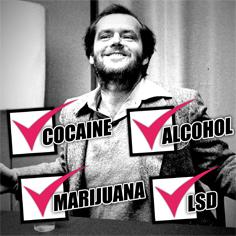Hollywood's Biggest Druggie? New Tell-All Exposé Reveals Jack Nicholson's Chronic Drug Use

Sept. 19 2013, Published 1:43 p.m. ET
Hollywood legend Jack Nicholson was one of the most prolific actors of his time before recently deciding to retire. But his rise to the top wasn't just fueled by ambition and talent: A new memoir, Nicholson, by Marc Eliot, reveals how Jack's drug use was intimately tied with his career successes -- and failures -- for many years.
It all started, Eliot claims, with LSD, which Jack first tried in the early 60s.
"Jack's experiences with the drug were life-changing," Eliot says. "He believed after taking it the first time that he had seen the face of God. He also had castration fantasies, homoerotic fantasies, and revelations about not being wanted as an infant."
LSD became such a big part of their lives, according to the book, that when their marriage began to crumble and they consulted a therapist, they each took acid before the first session!
And as Jack began to get into screenwriting, acid was coursing through his veins, Eliot writes, claiming he wrote the screenplay for 1967's The Trip while, appropriately, on a trip of his own.
He also "regular got stoned and dropped acid" during the writing of the Monkees feature Head the next year, Eliot claims.
And in a big meeting to secure funding for the movie that would become Easy Riders, Jack allegedly greeted the potential investors with a joint.
During the filming of the movie, cast member Karen Black would later reveal, cocaine and alcohol were constant presences on set.
Jack would later admit, "Being stoned has helped me creatively with writing … it's easier to entertain yourself mentally."
Allegedly, it helped him with his acting as well.
His ex-girlfriend Susan Anspach once claimed that he used cocaine to get through the infamous crying scene in 1970's Five Easy Pieces. "Jack took one toot for every six takes," she said, and it took 39 takes for him to get it right. "He frequently left the set to snort."
Marijuna was allegedly the drug of choice on the set of The Last Detail in Toronto in 1973. "To keep warm and stay high, which he was most of the time," Eliot writes in the book -- which was first excerpted by the National ENQUIRER -- Jack and a friend "chain-smoked joints during the entire shoot as if they were Camels."
Soon, however, he began to realize that his drug use was taking a toll on his career. When Jack said drugs "ain't no big thing" in an interview with People magazine, he subsequently lost out on the role of Rooster Hannigan in Annie because Carol Burnett, who had been cast as Mrs. Hannigan, was a stringent anti-drug crusader. She later wrote an open letter to him in the same magazine explicitly addressing his comment.

By the late 80s and 90s, Eliot writes, Jack's drug use came to a halt due to physical problems and grief over the deaths of several close friends. But the truth remains that much of his early success was intertwined with drug use, as he himself has admitted.
Does Jack owe his career to illegal drugs? Or would he have seen the same success if he started out sober? Let us know in the comments.


